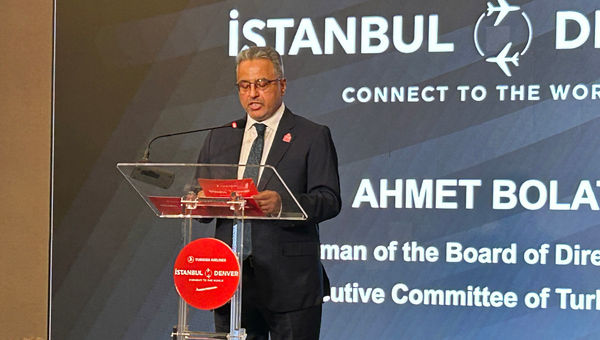DENVER -- Turkish Airlines is targeting Minneapolis, Charlotte, Philadelphia and Orlando as future U.S. destinations, said the carrier's chairman, Ahmet Bolat, during a June 11 interview in Denver, where Turkish had landed earlier that day for the first time.
The carrier is now serving Denver three times per week, with an increase to four times weekly coming on July 9. Denver is Turkish's 14th U.S. route, all from Istanbul.
"The number of destinations will go up to 20 in the U.S.," Bolat said confidently, though he stopped short of estimating a timeframe for those developments, or even for the launch of Turkish's next U.S. route. The first priority, the chairman said, will be to bring the carrier's Istanbul-Detroit service, which launched in November, to daily from its current six times per week and to bring the Denver service to daily, as well.
Turkish, a Star Alliance member that now serves 347 destinations in 130 countries, has 75 Airbus A350 widebodies on order and options on 15 more. Turkish is also considering ordering the Boeing 777x, depending on how the craft, which has not yet been certified, ultimately performs, Bolat said.
The orders are tied to Turkish's ambition to double its capacity over the coming decade, increasing its fleet size from approximately 460 planes today to approximately 810 (including its low-cost brand, AJet).
Along with adding U.S. routes, Turkish plans to use its additional widebodies to bolster capacity in Africa and increase frequencies across its network, especially in Asia, Bolat said. More frequencies will further the carrier's positioning in the East-West connecting market, on which it competes with Emirates and Qatar Airways, among others.
Turkish, which is 49% state-owned, also plans to utilize its fleet build-up to add approximately 50 destinations to its already expansive route network, though the number of strong options is dwindling, Bolat noted.
"How many more can you do?" he asked rhetorically.

Turkish Airlines chairman Ahmet Bolat speaks at a gala celebrating the carrier's first flight to Denver. Photo Credit: Robert Silk
Turkish Airlines' NDC initiative
Joining the Turkish chairman in the interview room was the carrier's chief commercial officer, Ahmet Olmustur, who spoke about plans to roll out an NDC program on Oct. 1. The platform, called TK Connect, will be available to travel advisors via three options: direct connect, a web-based booking portal or third party via aggregators. Amadeus, Sabre and Travelport will be among the approved aggregators, Olmustur said.
Turkish will implement a surcharge on legacy GDS bookings in conjunction with the launch of its NDC program but has yet to publicly reveal the amount.
Olmustur said that Turkish will remove some low-fare content from legacy GDSs with the launch of TK Connect.
"We will only have maybe one or two classes at the bottom to differentiate our product from the legacy channels, which means we'll make a very smooth pass for the agencies," he said.
Conversely, he added, travel advisors will benefit from the ability to sell ancillaries, including extra bags and extra-legroom seats as well as other enriched product offerings.
Olmustur said agencies can expect the Turkish NDC platform won't have the servicing problems that have haunted NDC rollouts by earlier airline adopters. Turkish, he said, has learned from what those airlines have struggled with over the past several years, and the airline will also benefit from building its NDC interface using the most recent IATA standard.
"We made our product to deal with NDC's problems," Olmustur said.